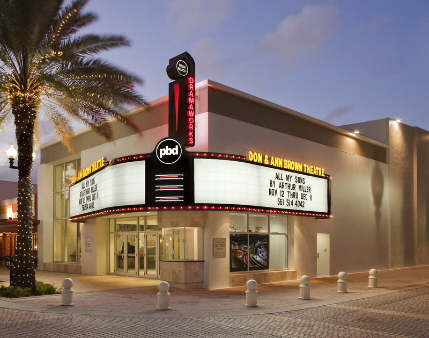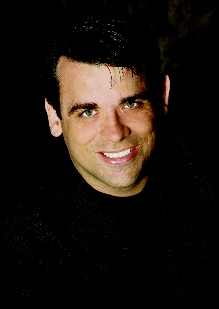 By Bill Hirschman
By Bill Hirschman
Palm Beach Dramaworks is embarking on what may ramp up to be the most ambitious new plays development program in South Florida history: Dramaworkshop.
Starting now and evolving over the next three years, the company will build an ongoing framework to find and nurture nascent scripts through readings and workshops in a rehearsal room upstairs to be turned into a studio theater.
The process may result in a few scripts receiving a full production on the main stage, even sending plays out to other companies or seeing them published, said producing artistic director William Hayes.
But the program also creates a paid core of as many as two dozen actors and other theater professionals who would work intermittently in varied parts of the process and would perform when those works are tried out.
That last aspect – an intentional thank you to the local professionals who have supported Dramaworks during its 14-year history — gives artists another reason to stay in the region. That local slant is mirrored as well in the script selection process that gives an inside track to Florida-based playwrights by allowing them submissions without an agent, although others will be considered if their agent submits a manuscript.
New and newish plays have become a major programming facet of South Florida theaters, especially those trying to attract pre-retirement age audiences. But the vision of this initiative is more multi-faceted even than what occurred at Florida Stage, which produced only new plays before closing in 2011 in Palm Beach County.
But Dramaworks has gravitated mostly to established American plays by such masters like Edward Albee and internationally challenging masterpieces such as absurdist works by Eugene Ionesco. That will continue.
“I’m not changing the mission midstream,” Hayes said Monday. “Our mission has always been ‘theater to think about,’ ” he said quoting the company’s motto. He said this initiative fits squarely in that definition while also recognizing a civic and cultural responsibility to nurture new work.
On the surface, Palm Beach County theatergoers haven’t seemed as hospitable to new work in recent years. Almost no company in the county has regularly produced world premieres since the closing of Florida Stage. Outré Theatre Company, which does edgy but established new works like Mr. Marmalade, is leaving its Mizner Park venue for Broward County.
Instead, older patrons who provide the backbone of the county’s audience gravitate to the Maltz Jupiter Theatre and the new Wick Theatre, which skew toward familiar mainstream titles. Only Slow Burn Theatre Company in Boca Raton has found an audience for more contemporary musical fare, thanks to an audience that tends to be younger.
 But Hayes and Dramaworkshop chairman Mark Perlberg are certain the market for new work exists because a portion of their audience has told them so.
But Hayes and Dramaworkshop chairman Mark Perlberg are certain the market for new work exists because a portion of their audience has told them so.
“One of the reasons our organization started so small is because we had to find that audience and build that audience,” Hayes said. As far back as when Dramaworks was mounting Albee plays in a small storefront, “people said we need to do this; we need some intellectual theater going on.”
Hayes, Managing Director Sue Ellen Beryl, Company Manager Nanique Gheridian and their staff have sought and encouraged that audience until they now host 5,000 subscribers. Several patrons complain when the theater schedule slips into less challenging fare. “I have been trying to identify these people for 15 years,” Hayes said.
When Dramaworks produced Athol Fugard’s Master Harold…And The Boys and Lorraine Hansberry’s A Raisin In The Sun to confront the issue of race, “80 percent of the audience would stay to discuss the work” at talkbacks, Hayes said.
Beyond that, Dramaworkshop is a commitment to the cultural future of the country at a time when government support of the arts is shaky.
“With what’s going on in this country, there just aren’t enough forums for this to happen,” said Perlberg, a former chairman of Dramaworks’ governing board. A full-fledged process is increasingly rare to serve today’s playwrights and allow them hear their work even a reading around a table.
The local commitment is underscored by how the program will be funded. Hayes planned to seek new donors not currently giving to the theater, so that the new program would not cut into contributions to the current budget.
He envisioned seed money of $400,000 coming in $50,000 chunks paid over five years from eight philanthropists. The money would be a gift, not an investment. In return, the donors will have exclusive invitations to readings, credit in the programs of any play developed, a plaque in the upstairs lobby and credit when any play is published during the first five years.
But when Hayes contacted some loyal supporters for names of likely candidates for new blood, five immediately volunteered to increase their own current contributions. He now has seven “founding producers:” the Alper Family Foundation, Penny Bank, Susan Bloom, Ralph and Calla Guild, Marilyn Meyerhoff and Sam Feldman, Jay and Nancy Parker, and Lee Wolf.
“And I haven’t asked a soul for money,” Hayes said.
The program will be phased in. This month, the company hired veteran local actress Susan Hyatt as program administrator. The program will also begin a long process of gathering the adjunct corps who will work for the project on a stipend.
The plan is to accept scripts solely during a 60-day window this fall, likely from November to December. Some of the adjunct corps’ actors will screen the expected hundreds of scripts during January and February. The first round finalists would be selected around April and May.
The next step each year would be a series of table readings, rewrites, then private and public workshop productions, more rewrites, then perhaps two “developmental productions” meaning fully-staged mountings that are not open for criticism. But at each step, public feedback will likely be solicited, especially from the producers.
Most of these would be held in the theater’s second-floor rehearsal space. Sometime in the next year or two, the space would be renovated into a 25 to 40-seat Perlberg Studio Theatre. But the most successful works might be worked into the regular main stage season, although there is no guarantee of that.
The adjunct corps is not meant to be a true repertory company on full-time salary. But Dramaworkshop would provide a revenue stream for numerous actors and other professionals who have worked at Dramaworks for many years.
“You have these artists who have worked for Dramaworks for years, and Dramaworks feels committed to them,” Perlberg said, “The truth is there are only so many main stage productions and so many roles” in the entire region. “This is an opportunity to have a multi-year relationship. It will also be very beneficial to the playwrights because they will be dealing with a group that has trust in each other, trust in the organization. You get that chemistry.”
The initial years’ would have a budget of about $100,000 annually. By the third year, Dramaworks would be seeking grant support and may receive income for the program from any subsequent productions and publishing income.
The new initiative is yet another carefully-plotted expansion of a company that has created a double reputation for quality theater and unusually sound business practices. It mounted its first production in 2000 in Palm Beach Atlantic College’s auditorium. The company won over fervent fans and carefully cultivated community support through 2011 when it moved into a renovated venue once occupied by the Cuillo Theater on Clematis Street in downtown West Palm Beach. Over the years, it has expanded to feature concert versions of musicals and a master playwrights series that combines lectures with staged readings.







 A PaperStreet Web Design
A PaperStreet Web Design

One Response to Dramaworks’ Dramaworkshop May Become Region’s Most Ambitious New Play Program